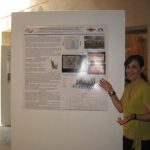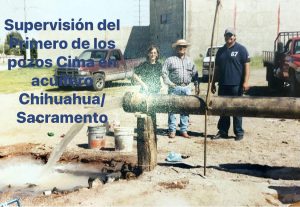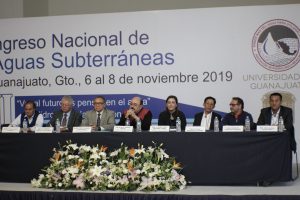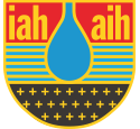“…be a factor of change in communities, remembering that, while it is very common to criticise and limit what might be proposed as different ways of doing things, in the end it is the results that justify the reason for any changes.”
August 2021: We grateful to Carmen Julia Navarro, for her thoughts. Carmen is Head of the Hydraulic Sectorization Department, Municipal Board of Water and Sanitation of Chihuahua and current President of IAH’s Mexico National Chapter..
 Tell us about yourself….
Tell us about yourself….
I am a Civil Engineer, I have a Master’s degree in Water Resources Engineering from the Autonomous University of Chihuahua and a PhD in Materials Science from the Advanced Materials Research Centre.
When I started my engineering career, there were only one or two women per generation on the faculty. In those days, it was a challenge for a woman to study engineering, especially because the facilities, such as the bathrooms, were not adequate. In my school there were two toilets for women, one for administrative staff, which had a door and was far away from the classrooms, and to use it you had to walk all the way through the corridors of the school, which led to unsolicited comments and unwanted “compliments”, which today would be considered to be alarmingly sexist; the toilet for female students was near the basketball courts and was without a door owing to vandalism, so its use meant collaborating with trusted colleagues, arranging for women to be well accompanied and for someone to ‘guard the door entrance so that men wouldn’t enter while you were there’. Some female colleagues gave up their studies because of this adverse environment; others were taught not to give up and to prepare for the work environment.
To my surprise and to the others at the end of my degree (because my intention was never to get the best marks, as I already had work commitments alongside my studies and I had two babies), I was told that I had won first place in my civil engineering cohort. As was customary for that distinction, I was asked to give a speech of thanks and reflection. I remember being asked to give up that right, because it was not “normal” to see a woman on the podium. I replied that I had already received sage advice (from my father) that I should not allow anyone to disrespect me or take away my courage.
 I reflect on those times, dealing with the behaviour of some and the difficulty of getting my work valued by others, and on what I had to do to find my own place . These experiences characterised my training and my conviction that career has no gender: developing myself through conviction, perseverance, and fighting against the fear of failure or being singled out for not being “normal”.
I reflect on those times, dealing with the behaviour of some and the difficulty of getting my work valued by others, and on what I had to do to find my own place . These experiences characterised my training and my conviction that career has no gender: developing myself through conviction, perseverance, and fighting against the fear of failure or being singled out for not being “normal”.
I learned that the value of being an engineer is not really the title, but what comes from the conviction to be, that someone wants to be, not simply who they “should” or are allowed to be. Nor that the female engineer has to fit in by becoming more masculine or give in to gender stereotypes to get a place in the professional environment. Rather, you must use the tools of engineering, learn and understand the knowledge, reason it for its application and not remain silent, because if you know, you have to believe it, say it and apply it, but above all communicate it to allow a thoughtful analysis and seek the solution to any problem that is addressed.
Over the years I have worked professionally in: applied engineering at the three different levels of government in Mexico, (National Water Commission, Central Water and Sanitation Board of the State Government and Municipal Water and Sanitation Board). Also in academia from high school to doctorate level; in private initiative in civil affairs and hydraulic works and consultancy for public utilities companies.
I have participated in projects with different nationally recognized institutions, in some cases being the project supervisor or project leader or technical manager, among which I can mention (IMTA, UNAM, ITESM, CIMAV, OECD), I have supervised theses at undergraduate and doctoral level; all these research projects related to sustainable development of water supply to the community. I have contributed to publications, books, articles and technical-scientific journals. I have participated as a speaker in national and international congresses on topics related to water management and engineering. As an instructor at the Water School (ANEAS/CONAGUA), I have given numerous training courses for companies and organisations on the urban water cycle, from abstraction to water reuse. I am an active member of several associations.
Why did you join IAH?
When I was studying my master’s degree in 1996 my teacher and mentor, Dr. Adolfo Chavez, instilled in us to seek the evolution of knowledge. He was a member of IAH and lent us its publications. Then in the workplace when I wanted to try to implement any of change in methods, I was without any database or systematic ways to analyse, except subjectively and conceptually. I sought to become a member but it was very complicated still because there was not the ease of the internet. So things continued, a loan system of the journals via my academic tutor. It was a time when analysis technology was triggered by commercial mathematical models. We realised that, although we believed we had a lot of information, the quantity and quality of data was insufficient for decision-making. When arrangements could be managed easily through the internet I became a member of the IAH.
Any career experiences you have learned from, that you are willing to share with others?
Yes, sometimes we or others undertake an activity we are familiar with and learned that “it was the best”. But we all understand that knowledge is not static. Although we use the formulas from n years ago, and they still explain the theoretical behavior of many aspects, most of the time in decision-making, we should apply the inverse model for the reality and how it relates to such theoretical behaviour to address the situations.
Mostly, scientific technical articles are only small samples of a behaviour. When decision makers, or even the elite who have knowledge and research interests, try to apply the science, missing links are discovered. This can be especially the case in developing countries.
What have been the biggest changes you’ve seen over your career?
That increasingly the users accept those who provide knowledge without questioning them, particularly if it is clear they have practical experience of application, not just theory or academic knowledge.
What are your concerns now or for the future, relating to groundwater/water/hydrogeology?
That much remains to be done. We can distinguish three groups, the first one those (users) who are able or obliged to generate and manage data, must have the support to make reliable databases, which help to improve the sustainable use of groundwater, but are more concerned and occupied by the daily problems [and, therefore, the need to solve them]. The second group are those (researchers and academics) who analyse and propose for the short to medium term future, but are not transferring knowledge to users. And the third group is society and government, who have no elements of judgement from the two previous groups and who only “propose” and expose the fundamentals of the “shoulds”. So there are no links and no articulations, because all this costs time and money. Until there is adequate funding and a procedure where the three groups are articulated, what will continue to matter more to researchers is that writing papers that may give a good proposal where to focus efforts for future funding, but that the users who face the problem and “solve it” do not even see. That worries me, that in this polarised world, there are those who know and those who do. Increasingly, the problems we see now will grow and become more and more complex to understand, making solutions more difficult.
What three tips might you give to someone just starting out on their career?
- Always seek to develop greater knowledge.
- Feel confident in what you know and apply it.
- Share what you know, as this enhances your own understanding as you learn from others, including those without a degree or formal academic training.
As an employer, what skills or “special something” might you be looking for?
Someone who is open to learning and developing skills, but above all seeking to share it. Good technology skills. Looking for solutions from anywhere in the world that might offer them.
 Your future plans? Aspirations?
Your future plans? Aspirations?
My hope is that someday, when looking at a technical profile, I will be independent of gender. I take life as it comes; it has meaning but no particular direction or goal.
What has being a member of IAH brought to you?
Greater knowledge, analytical capabilities and friends from other countries.
Is there anything IAH should be doing? Could do better?
If it could, provide a not so “elitist” space for those who do not need to understand the whole mathematical process, but rather understand the reasons why in order to apply the methodology and in what ways they can benefit. I consider that unless the knowledge within IAH is better transferred to others (especially users), there cannot be drivers of change for groundwater management more locally, which can then make a global revolution.
Additional comments – matters you would like to raise?
Special attention should be paid to the large number of people who do not speak or master English; make publications in Spanish. Consider countries with major groundwater problems and their mother tongues to transfer knowledge and develop local capacities of users and decision-makers.
Carmen Julia Navarro
ed: Carmen presents some strongly held views on issues that are also considered in our statement on Equity (or Equality), Diversity and Inclusion (see https://iah.org/about/statement-on-equity-diversity-and-inclusion).



